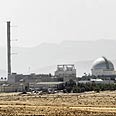
Muslim nations criticize Israel over nukes
Arab nations in IAEA demand Israel open nuclear program to international purview, but stop short of pushing for resolution directly targeting Israel by name
Muslim countries at a 151-nation conference demanded Friday that Israel open its nuclear program to international purview, asserting that its undeclared arsenal is a threat to Mideast peace.
Unlike in recent years, however, Arab states did not push for a resolution directly targeting Israel by name after such an attempt was narrowly voted down at last year's International Atomic Energy Agency general conference.
Related stories:
- 'Obama sold special bombs to Israel'
- Iran blames Israel for killing nuke scientists
- Defense establishment to simulate nuke facility attack
And with few exceptions, the tone of the verbal attacks on the Jewish state appeared less confrontational. A planned IAEA meeting in November would bring Arab nations and Israel to the table to explore what can be learned from other regions that have set up zones free of weapons of mass destruction.
As in past years, the conference did pass a resolution calling on all Middle East states to adopt the Nuclear Nonproliferation Treaty in an indirect demand on Israel, the only country in the region not bound by the treaty.
But even Israel did not oppose that document, abstaining instead of voting against it after failing to have a specific paragraph that effectively singled out the Jewish state without naming it struck from the document.
'Israel's nuclear arsenal threatens region'
In comments echoed by other Arab states before and after the vote, Syrian nuclear chief Ibrahim Othman said Israel's refusal to join the nonproliferation treaty and throw open its nuclear facilities to IAEA perusal "is a threat ... to the security and stability of the Middle Eastern states."
"The international community must bring real and genuine pressure to bear on Israel," Othman said.
Egyptian chief delegate Khaled Rahman Shamaa, speaking for developing nations — a group traditionally supporting the Islamic bloc — urged the meeting to address the nuclear imbalance allowing "one party to threaten its neighbors and the region."
Iranian delegate Reza Pourmand, meanwhile, chastised "the Zionist regime," asserting that Mideast peace and stability will remain out of reach "while the nuclear arsenal of this regime continues to threaten the region and beyond."
Both Iran and Syria are the focus of IAEA investigations. While Muslim countries view Israel as the greatest nuclear threat, the Jewish state along with the US and other Western nations sees Tehran — and to a lesser extent Damascus — as the main problem.
- Follow Ynetnews on Facebook
- Receive Ynetnews updates directly to your desktop










